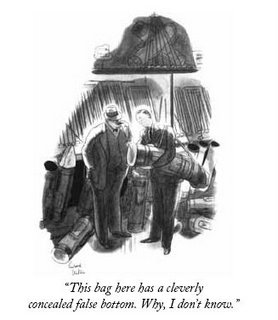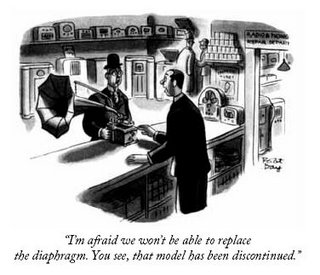 Artist : Richard Decker Publication: The New Yorker 4 Jul 1936
Artist : Richard Decker Publication: The New Yorker 4 Jul 1936Technology could be frustrating. We all experince it all the time. Frustrating for all - seller, buyer, user.
Andrew Odlyzko says : "We were frustrated with computers a decade ago, we are frustrated with them now, and will continue to be frustrated in the future. As long as technology offers enticing new products and services, we will continue to live on the edge of intolerable frustration...
If the level of frustration is not going to decrease, is there any point in developing new technologies, and in paying any attention to ease of use? There certainly is. We will still be frustrated, but at a higher level of functionality, and there will be more of us willing to be frustrated....
Building complicated systems that work is hard. Building ones that work and are user-friendly is much harder.
"
Edward Tenner points out: "Microsoft has triumphed because it has given us what we asked for: constant novelty coupled with acceptable stability, rather than the other way around. ... People talk simplicity but buy features and pay the consequences. Complex features multiply hidden costs and erode both efficiency and simplicity."
 Artist : Robert J. Day Published : The New Yorker 29 Feb 1936
Artist : Robert J. Day Published : The New Yorker 29 Feb 1936
No comments:
Post a Comment